Resources Sustainable

What are the benefits of sustainable consumption ?
The text discusses the benefits of sustainable consumption, which include environmental protection, economic benefits, social well-being, and ethical considerations. By making conscious choices about what we consume and how we dispose of our waste, we can reduce our carbon footprint, conserve natural resources, preserve biodiversity, save costs, create jobs, promote healthier lifestyles, ensure equitable distribution of resources, build community, protect animal welfare, support fair trade, and encourage transparency and accountability in businesses. Sustainable consumption is crucial for creating a more sustainable future for ourselves and future generations.

Is biomass energy a sustainable solution, considering the resources required to produce it ?
The text discusses biomass energy, which is derived from organic materials like wood, crops, and waste. It is often considered a sustainable alternative to fossil fuels, but its sustainability depends on various factors such as land use, water consumption, nutrient management, and energy inputs. The potential environmental impacts include carbon emissions and waste management. Economic considerations involve job creation and cost competitiveness. Social impact includes energy access and public health. Biomass energy has the potential to be a sustainable solution, but its actual sustainability depends heavily on how it is produced and utilized.
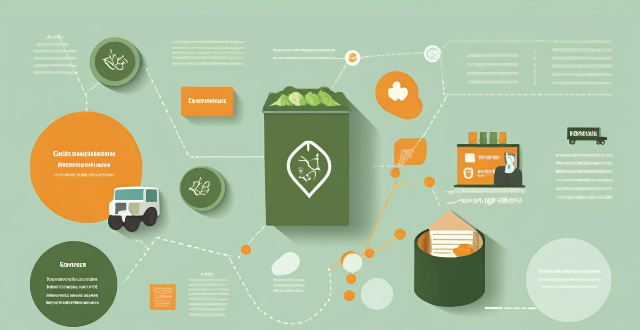
How can businesses contribute to sustainable consumption ?
Businesses can contribute to sustainable consumption by adopting circular economy principles, managing green supply chains, using eco-friendly packaging, practicing product stewardship, improving energy efficiency, conserving water, engaging in responsible marketing, promoting innovation, engaging stakeholders, and supporting environmental initiatives. These practices help reduce waste, minimize resource use, and inspire sustainable consumer behavior.
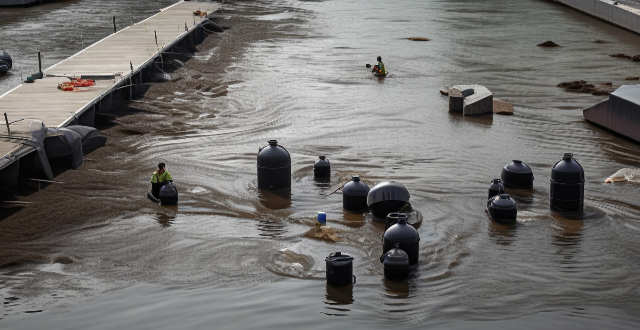
How can we ensure equitable access to water resources for all communities ?
Ensuring equitable access to water resources for all communities requires a multi-faceted approach, including investment in infrastructure, promotion of sustainable water management practices, implementation of policies and regulations, collaboration with local communities, and monitoring progress.

What are the potential economic benefits of mining resources on other planets ?
The article discusses the potential economic benefits of mining resources on other planets, including increased availability of resources, creation of new jobs, advancements in technology, stimulation of economic growth, diversification of energy sources, and expansion of human habitat.

How does sustainable consumption impact the economy ?
Reduced resource depletion, lower energy costs, increased innovation, and improved public health are some of the key benefits of sustainable consumption. While there may be short-term costs associated with transitioning to more sustainable practices, the long-term benefits far outweigh these costs.
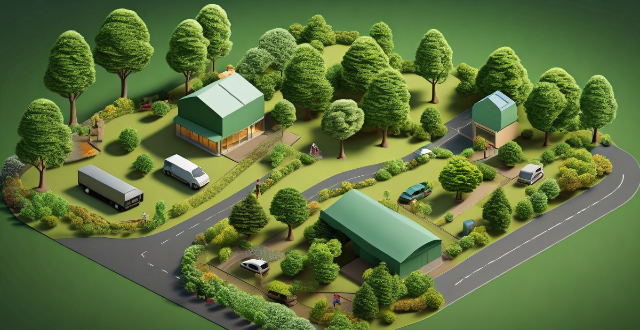
What are the benefits of using sustainable energy sources ?
Using sustainable energy sources provides environmental, economic, and social benefits. These include reduced greenhouse gas emissions, improved air quality, conservation of natural resources, protection of ecosystems, cost savings, job creation, energy independence, stable energy prices, improved public health, community resilience, education and innovation, and increased energy access. Transitioning to sustainable energy is essential for our future prosperity and survival.

How can we ensure equitable access to climate adaptation resources within communities ?
The article discusses strategies for ensuring equitable access to climate adaptation resources within communities. It emphasizes the importance of community participation, transparent planning processes, fair allocation of resources, diverse funding mechanisms, and monitoring and evaluation. The goal is to build resilient and sustainable communities that can cope with the impacts of climate change.
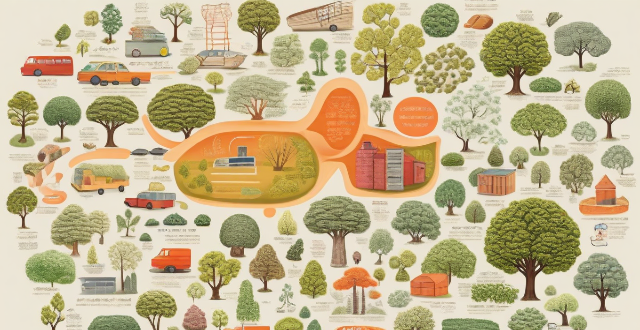
Is it ethical for developed countries to consume more resources than developing ones ?
The question of whether developed countries should consume more resources than developing ones is complex, involving considerations of equity, environmental stewardship, economic implications, and social-political dynamics. Ethical concerns include fair distribution of resources and meeting basic needs in developing nations, as well as the responsibility to reduce ecological footprints and mitigate global climate change. Practical considerations involve economic growth, infrastructure needs, national sovereignty, and compliance with international agreements. While ethical arguments exist against overconsumption by developed countries, economic realities and political factors complicate the issue. Many developed nations are adopting sustainable practices, and international cooperation is essential for equitable resource management and conservation. Striking a balance between current needs and future preservation is a universal challenge.
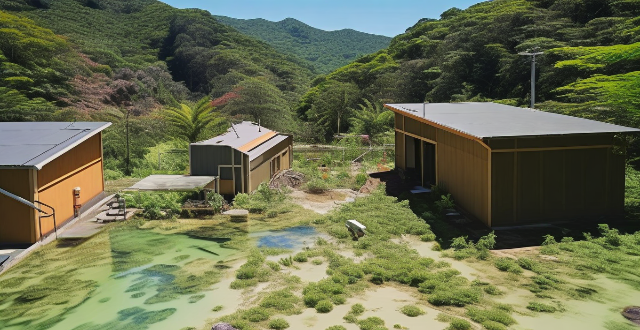
What is the importance of sustainable agriculture in achieving the Sustainable Development Goals ?
Sustainable agriculture is crucial for achieving the United Nations' Sustainable Development Goals by ensuring food security, improving rural livelihoods, and protecting the environment. It promotes soil health, increases crop yields, encourages biodiversity, creates jobs in rural areas, enhances income, promotes gender equality, reduces greenhouse gas emissions, conserves water resources, prevents land degradation, supports climate change mitigation and adaptation, stimulates economic growth, and reduces poverty. By adopting sustainable agriculture practices, we can create a more equitable and resilient world for future generations.

How do climate-friendly products contribute to sustainable development ?
The article discusses the importance of climate-friendly products in sustainable development. These products help reduce greenhouse gas emissions, conserve natural resources, support renewable energy sources, and encourage eco-friendly lifestyles. By using less energy or producing fewer pollutants during their production, use, and disposal, these products contribute to a healthier planet for future generations. Examples include energy-efficient appliances, electric vehicles, reusable water bottles made from recycled materials, bamboo toothbrushes, solar panels, wind turbines, hydroelectric generators, cloth shopping bags, and compostable food containers. As consumers become more aware of the environmental impact of their choices, they can make informed decisions that support a more sustainable future.

How does resource-efficient utilization contribute to sustainable development ?
Resource-efficient utilization is key to sustainable development, conserving resources, reducing waste, and promoting economic growth. It helps mitigate environmental impact, provides economic benefits, and enhances social well-being. As we face global challenges like climate change and resource scarcity, adopting resource-efficient practices is crucial for a sustainable future.

How can climate services be used to manage water resources effectively ?
Climate services play a critical role in water resources management by providing accurate and timely information on weather patterns, climate change, and related phenomena. These services can be used to forecast precipitation, monitor river levels for flood early warning systems, assess the impact of climate change on water availability, plan adaptation measures, monitor drought conditions, manage water quality, and protect ecosystems. By leveraging these services, we can ensure the effective use of water resources, adapt to changing climates, prepare for extreme weather events, and guarantee a sustainable water supply for future generations.

What are the best practices for managing water resources in agriculture ?
Proper management of water resources is crucial for sustainable agriculture, and there are several best practices that can help farmers conserve and use water efficiently. These include soil moisture monitoring, drip irrigation, mulching, rainwater harvesting, crop rotation and intercropping, efficient irrigation scheduling, integrated pest management, water-saving plants, and maintenance of irrigation systems. By following these practices, farmers can effectively manage their water resources while maintaining productivity and profitability in their agricultural operations.

How can we promote sustainable consumption ?
Sustainable consumption is a key factor in achieving a sustainable future. It involves making conscious choices about the products we buy, the resources we use, and the impact we have on the environment. Here are some ways to promote sustainable consumption: 1. Education and Awareness: Raise awareness about the importance of sustainable consumption; provide information on sustainable products and services; encourage responsible consumption habits. 2. Government Policies and Incentives: Implement policies that support sustainable consumption; offer incentives for sustainable practices; encourage circular economy principles. 3. Corporate Responsibility and Innovation: Encourage corporate responsibility; foster innovation in sustainable products and services; collaborate with stakeholders. 4. Community Action and Collaboration: Organize community events; create networks of sustainable businesses; engage with schools and youth organizations. By taking these actions at individual, community, business, and government levels, we can collectively move toward a more sustainable future where our consumption patterns support rather than harm the planet.
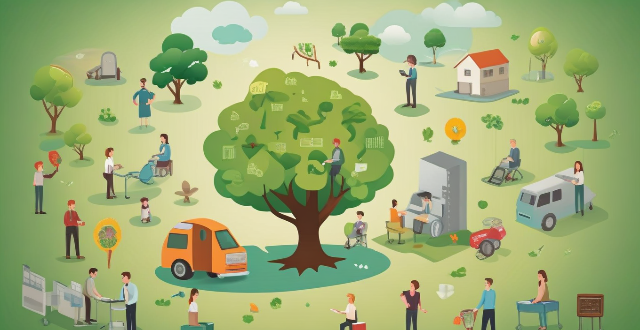
How can we create a sustainable economy that benefits both people and the planet ?
To create a sustainable economy that benefits both people and the planet, several strategies must be employed. These include shifting to renewable energy sources, promoting circular economy practices, encouraging green innovations and technology, implementing sustainable agriculture practices, supporting local economies and fair trade, and raising awareness and education about sustainability. By taking these steps, we can ensure the well-being of current and future generations while minimizing waste, reducing environmental impacts, and conserving natural resources.

What is the future of space tourism and its implications on Earth's resources ?
The development of space tourism by private companies like SpaceX, Blue Origin, and Virgin Galactic may make it more accessible to the public in the future. However, it raises concerns about its environmental impact, economic considerations, ethical concerns, and long-term sustainability. It is crucial to consider these implications to ensure responsible use of Earth's resources while exploring space tourism.

How can sustainable investing help achieve the United Nations Sustainable Development Goals ?
Sustainable investing, which incorporates environmental, social, and governance criteria into investment decision-making, can significantly contribute to achieving the United Nations Sustainable Development Goals. It promotes environmentally friendly practices, enhances social well-being, advances economic growth and innovation, upholds good governance and partnerships, drives market trends towards sustainability, and attracts conscience-driven consumers. By aligning financial objectives with positive societal impact, sustainable investing creates a framework for long-term, sustainable growth that benefits people, planet, and profit.
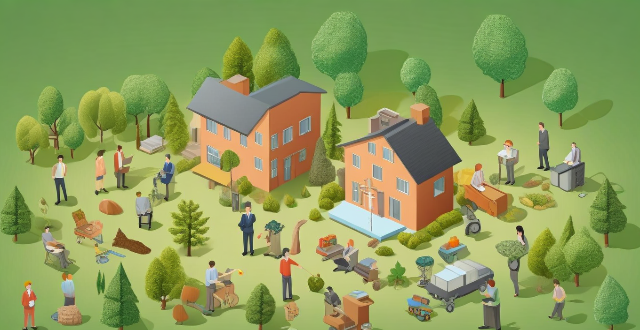
What is sustainable development and why is it important ?
Sustainable development is a concept that aims to meet the needs of the present without compromising future generations' ability to meet their own needs. It is crucial for addressing poverty, inequality, climate change, and environmental degradation. Sustainable development promotes economic growth, social inclusion, and environmental protection. It encourages renewable energy use, sustainable agriculture, and green technologies to create job opportunities and reduce unemployment. By ensuring access to basic services, it helps reduce poverty and improve living standards for all segments of society. Promoting gender equality is an integral part of sustainable development. It also focuses on reducing greenhouse gas emissions, adapting to climate change, conserving forests, protecting biodiversity and natural resources, controlling pollution, preventing conflicts over resources, aiding in post-conflict recovery, and reducing disaster risks. Sustainable development offers a framework for addressing complex global challenges while ensuring long-term ecological sustainability.

How can climate services contribute to sustainable development ?
Climate services contribute to sustainable development by providing essential information for decision-making in various sectors. They help inform policy decisions, support agriculture and food security, enhance natural resource management, promote energy efficiency and renewable energy, improve public health outcomes, and encourage resilience and adaptation. By utilizing the insights gained from climate services, we can work towards a more resilient, equitable, and sustainable future.

What role does waste reduction play in sustainable development ?
The article discusses the importance of waste reduction in sustainable development. It highlights the environmental, economic, and social benefits of waste reduction, including conservation of natural resources, protection of ecosystems, climate change mitigation, cost savings, job creation, innovation and efficiency, public health, education and awareness, and community engagement. The article emphasizes that waste reduction is an essential component of sustainable development and encourages individuals, businesses, and governments to take action to reduce waste.

What are the key challenges in managing water resources sustainably ?
Managing water resources sustainably is a complex task that involves various challenges, including climate change, population growth and urbanization, pollution and degradation of water bodies, overexploitation and unsustainable use, inadequate governance and policy frameworks, economic and financial constraints, social and cultural factors, technological limitations, ecological considerations, and international water sharing. Addressing these challenges requires a combination of technological innovation, policy reform, public education, and international cooperation. Sustainable water management is not only about ensuring enough water for current needs but also about preserving this vital resource for future generations.
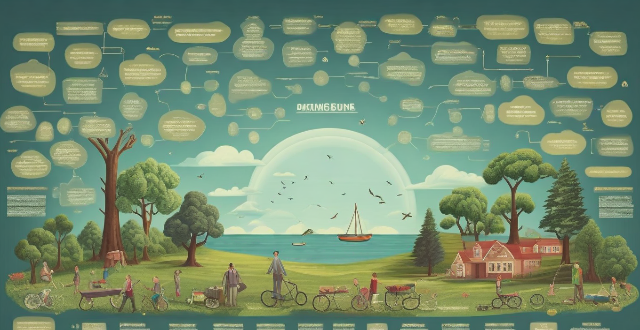
What role does environmental ethics play in sustainable development ?
The text discusses the significance of environmental ethics in sustainable development, emphasizing its role in recognizing the importance of the environment, promoting stewardship and responsibility, encouraging sustainable practices, addressing environmental justice issues, and fostering collaboration and partnerships. It highlights that by understanding the interconnectedness of all life on Earth, we can make more informed decisions about how to use and protect natural resources. The text also points out that environmental ethics promotes the idea of stewardship, which involves taking responsibility for protecting and preserving the environment for future generations. Furthermore, it encourages sustainable practices such as recycling, reducing carbon emissions, and using eco-friendly products to reduce our impact on the environment and contribute to long-term sustainability. Additionally, the text emphasizes the importance of addressing environmental justice issues to ensure fair access to natural resources and protection from environmental harm. Finally, it suggests that environmental ethics fosters collaboration and partnerships between individuals, communities, governments, and businesses to work together towards sustainable development goals.

How can we promote sustainable development to reduce the risk of climate conflicts ?
Sustainable development is crucial for reducing the risk of climate conflicts. To promote it, we can increase awareness and education, promote renewable energy sources, implement sustainable agriculture practices, invest in green infrastructure, encourage waste reduction and recycling, and collaborate with governments and NGOs.

What role do consumers play in promoting sustainable consumption ?
The article explores the role of consumers in promoting sustainable consumption. It emphasizes the importance of education and awareness, reducing waste, reusing items, recycling materials, supporting sustainable businesses, and advocating for change as key strategies for consumers to contribute to sustainable consumption. The article highlights the significance of these strategies in reducing environmental impact and conserving resources for a more sustainable future.

What impact does sustainable investing have on the environment ?
##Impact of Sustainable Investing on the Environment Sustainable investing, also known as responsible or green investing, is an investment strategy that focuses on companies and projects that have a positive impact on the environment and society. This type of investing has become increasingly popular in recent years as investors become more aware of the environmental and social impacts of their investments. The following are some of the ways sustainable investing can have a positive impact on the environment: ### Reduction in Carbon Emissions One of the most significant impacts of sustainable investing is the reduction in carbon emissions. Companies that prioritize sustainability often use renewable energy sources such as solar, wind, and hydro power to generate electricity. This reduces their reliance on fossil fuels, which are major contributors to greenhouse gas emissions. By investing in these companies, investors can help reduce carbon emissions and combat climate change. ### Conservation of Natural Resources Sustainable investing also promotes the conservation of natural resources. Companies that prioritize sustainability often implement practices that reduce waste, conserve water, and protect biodiversity. For example, they may use recycled materials in their products or implement water-saving technologies in their operations. By investing in these companies, investors can help conserve natural resources and protect ecosystems. ### Promotion of Clean Energy Sustainable investing encourages the development and adoption of clean energy technologies. Companies that prioritize sustainability often invest in research and development of new clean energy technologies such as electric vehicles, battery storage systems, and smart grids. By investing in these companies, investors can help drive innovation and accelerate the transition to a low-carbon economy. ### Support for Environmental Regulations Finally, sustainable investing supports the implementation of environmental regulations and policies. Companies that prioritize sustainability often comply with strict environmental regulations and support policies that promote sustainability. By investing in these companies, investors can help create a regulatory environment that encourages businesses to operate sustainably and protect the environment.

What are the best practices for sustainable groundwater management ?
The provided text discusses the importance of sustainable groundwater management and outlines several best practices to ensure the long-term availability and quality of this vital resource. These practices include monitoring and data collection, enhancing recharge, maintaining sustainable withdrawal rates, protecting groundwater from pollution, integrated water resources management, legal and policy framework, public participation and education, technological innovation, and responding to climate change. By following these guidelines, depletion, contamination, and environmental damage can be prevented, supporting ecosystems, agriculture, and human consumption.
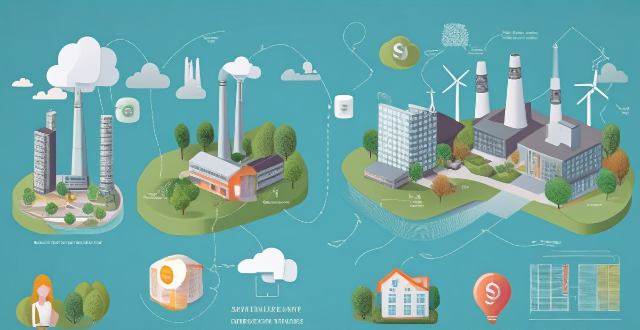
What is the relationship between energy conservation and sustainable development ?
In summary, energy conservation and sustainable development are interconnected concepts that share common goals. Energy conservation involves reducing wasteful consumption of energy resources, while sustainable development aims to balance economic growth, social progress, and environmental protection. The relationship between these two concepts is mutually reinforcing, with energy efficiency being a key component of both. Renewable energy sources, circular economy practices, and effective policy and governance structures are also essential for achieving sustainability goals. By prioritizing these principles, we can work towards a more sustainable future for ourselves and future generations.

Can sportswear companies produce more sustainable products ?
Sportswear companies can produce more sustainable products by using eco-friendly materials, reducing waste, and adopting circular economy principles.

How does climate financing work to promote sustainable development ?
Climate financing plays a crucial role in promoting sustainable development by providing the necessary financial resources for projects and policies that aim to mitigate climate change and adapt to its impacts. It works through defining climate financing, identifying sources of climate finance, establishing mechanisms for climate finance, promoting sustainable development, and addressing challenges and considerations. Climate finance can come from various sources, including public and private sectors, international organizations, and even individual contributions. Several mechanisms have been established to channel climate finance effectively, such as the Green Climate Fund (GCF), Global Environment Facility (GEF), and Climate Investment Funds (CIF). Climate finance promotes sustainable development by funding projects that align with the United Nations Sustainable Development Goals (SDGs), particularly those related to clean energy, sustainable communities, and responsible consumption and production. Challenges such as ensuring adequate funding, maintaining transparency, and achieving equitable distribution of resources must be addressed. In conclusion, climate financing is an essential tool for driving sustainable development by supporting initiatives that combat climate change while promoting economic growth and social well-being.